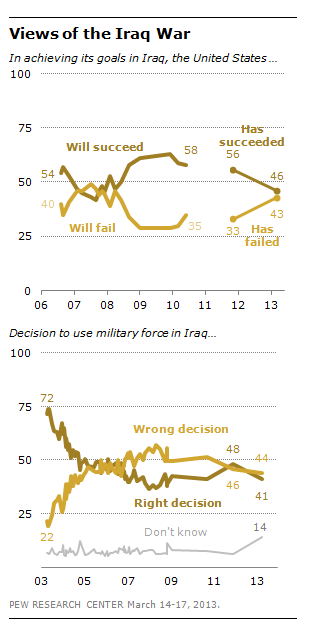Iraqi Prime Minister Nouri al-Maliki is due in Washington this week for meetings on Capitol Hill and with President Obama. He comes at a time of renewed violence in his country, including car bombings in Baghdad on Sunday that killed dozens of people. The Washington Post reports that, at the top of his agenda, is a request for more U.S. help in fighting an al-Qaeda affiliate said to be behind many of the attacks.
 As the struggle for stability in Iraq continued, Americans are divided over whether the decision to invade that country in 2003 and topple the regime of Saddam Hussein was the right or wrong decision. And, a decade after the 2003 invasion, the public is similarly divided over whether the U.S. had achieved its goals there.
As the struggle for stability in Iraq continued, Americans are divided over whether the decision to invade that country in 2003 and topple the regime of Saddam Hussein was the right or wrong decision. And, a decade after the 2003 invasion, the public is similarly divided over whether the U.S. had achieved its goals there.
A survey conducted in March found that 46% of Americans said the U.S. had mostly succeeded in achieving its goals in Iraq while 43% said it had failed to do so. That compared to a 2011 survey in which 56% of Americans had said the U.S. succeeded in Iraq.
When it came to using military force in Iraq, 44% said it was the wrong decision while 41% said it was the right decision. The public had also been divided on this question in 2011: 48% said it was the right decision and 46% said it was the wrong decision.
While more Republicans said in this year’s survey that the U.S. had achieved its goals in Iraq than had failed (56% to 36%), the number holding that view was the lowest since the question was first asked in 2006. While 58% of Republicans believed the decision to go to war was the right one, that number also showed a steep decline, falling 14 percentage points since 2011.



